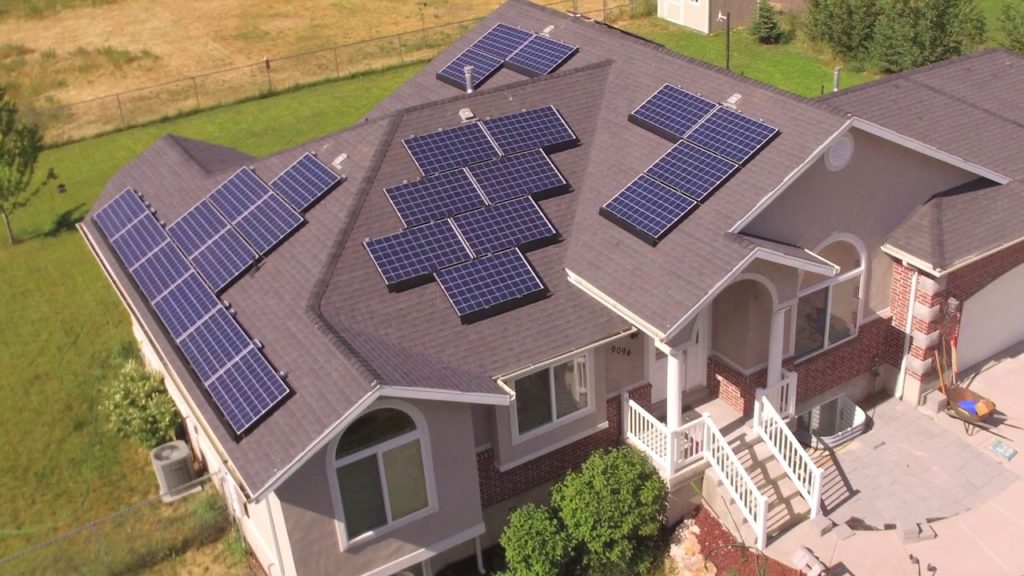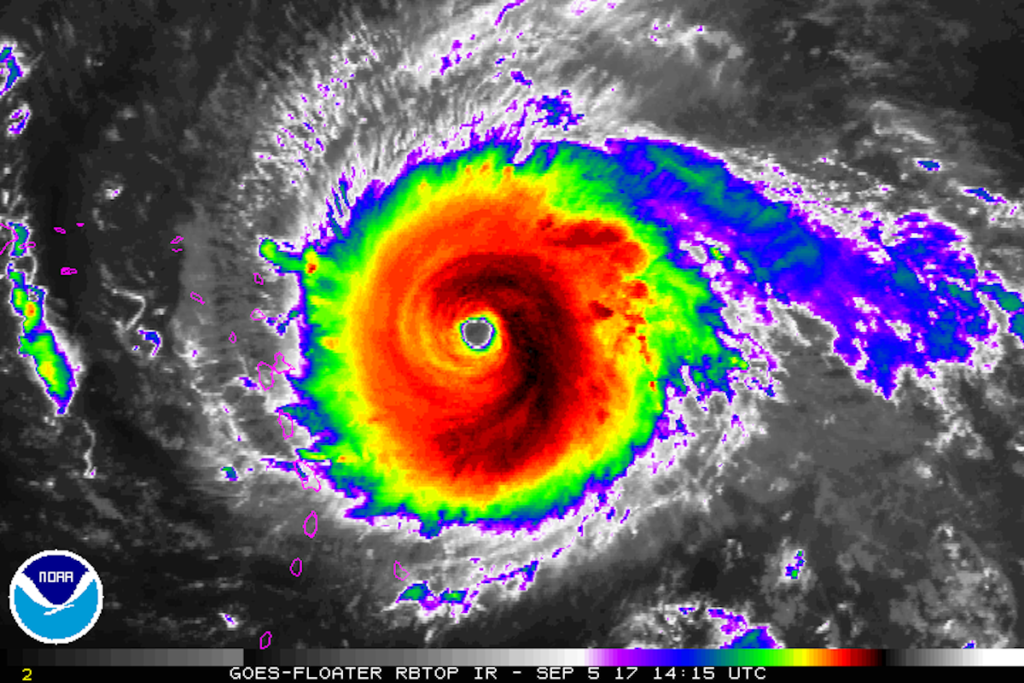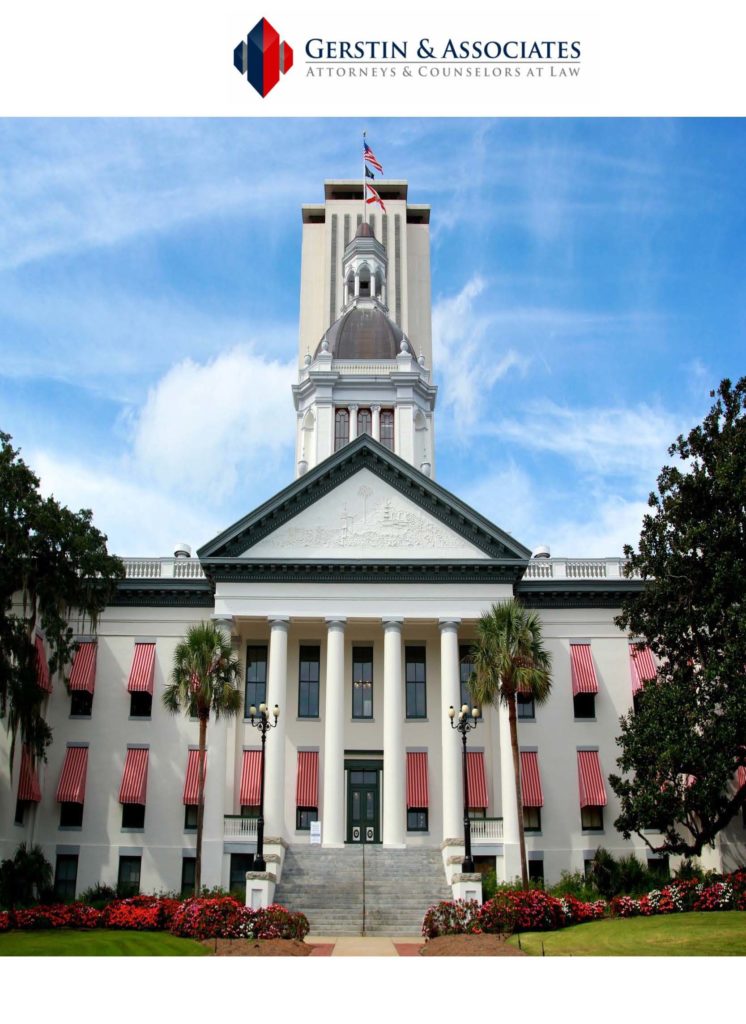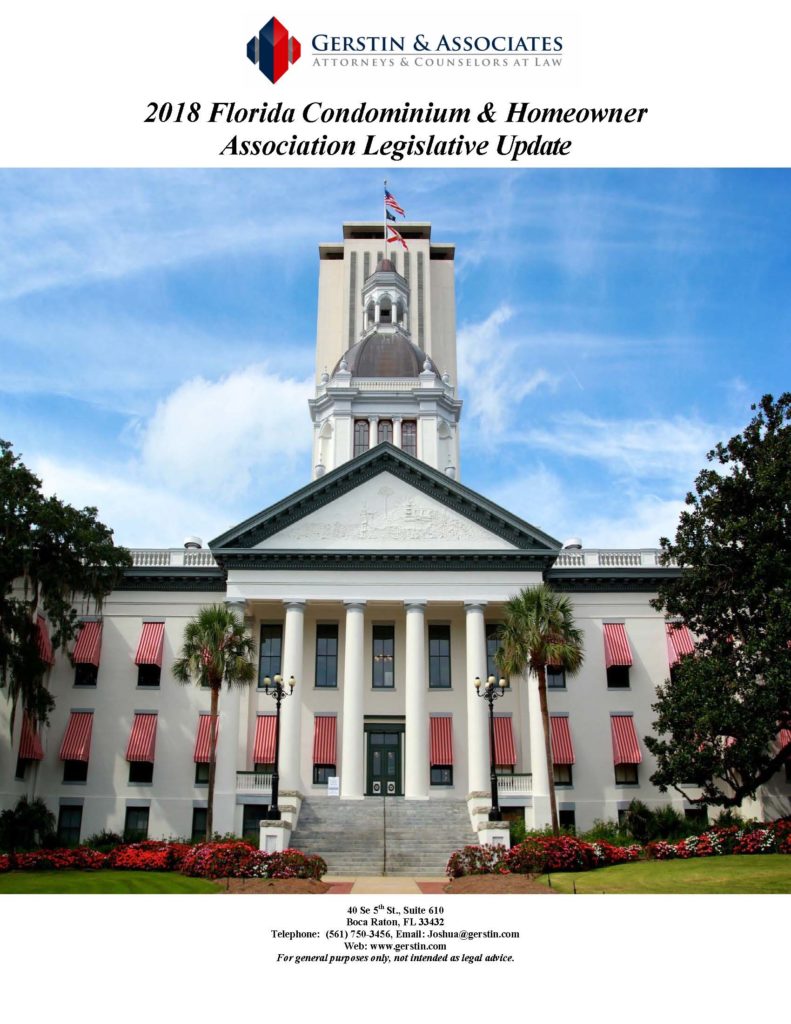
-By Joshua Gerstin, Esq.
click here for .PDF of this article
“A butterfly flaps its wings in Africa, and a hurricane lands in Florida six months later.” The same can be said about community associations. A few bad actors in one part of the state are caught, and six months later, an entirely new regulatory scheme for community associations is passed.
Known as “Condo 3.0,” the recently passed legislation affecting condominium associations is extensive. Plan ahead to avoid issues, the legislation goes into effect on July 1, 2024.
Although not as extensive as the condominium association legislation, homeowner associations were not spared extra regulation. The legislation affecting homeowners associations goes into effect on July 1, 2024.
CS/CS/CS/HB 1021 — Condominium Associations Effective July 1, 2024.
Click here for the full text of the bill
Community Association Managers
The bill requires community association managers (CAMs) and CAM firms to return all community association records in their possession within 20 business days of termination of a services agreement or a written request whichever occurs first, with license suspension and civil
penalties for noncompliance, except that the time frames applicable to timeshare plans apply to the records of a timeshare plan.
The bill provides conflict of interest disclosure requirements and a process for associations to follow when approving contracts with CAMs and CAM firms, or a relative, that may present a conflict of interest. The requirements are similar to the conflicts of interest provisions for condominium associations and their officers and directors, including:
- Providing that, if the association receives and considers a bid to provide a good or service that exceeds $2,500, other than community association management services, from a CAM or CAM firm, including directors, officers, persons with a financial interest in a CAM firm, or a relative of such persons, the association must also solicit multiple bids from other third-party providers of such good or service.
- Requiring that the proposed activity that may be a conflict of interest must be listed on, and all contracts and transactional documents related to the proposed activity must be attached to, the board’s meeting agenda and entered into the meeting minutes.
- Requiring the board must approve the contracts with a potential conflict of interest, and all management contracts, by an affirmative vote of two-thirds of all directors present.
Milestone Inspections
Currently, single-family, two-family, and three-family dwellings are exempt from the milestone inspection requirements. The bill exempts four-family dwellings with three or fewer habitable stories above ground.
Official Records – Condominiums
Regarding access to the official records of a condominium association, the bill:
- Provides that, if records are lost or destroyed, there is a good faith obligation to obtain and recover the records as is reasonably possible.
- Allows e-mail addresses and facsimile numbers to be accessible to unit owners if consent to receive notice by electronic transmission has been provided.
- Prohibits the sale or sharing of such personal information to third parties.
- Effective January 1, 2026, decreases from 150 units to 25 units the threshold requirement for an association to maintain specified records available on the association’s website or on a mobile device.
- Requires official records to be provided to the unit owner at no charge if the Division of Condominium, Timeshares, and Mobile Homes (division) within the Department of Business and Professional Regulation (DBPR) subpoenas records an association has failed to timely provide in response to a unit owner’s written request.
- Requires associations to maintain additional financial records (e.g., invoices and other documentation that substantiates any receipt or expenditure).
- Requires associations to respond to a records request with a checklist of all records provided.
- Authorizes the division to request access to an association’s website to investigate complaints related to unit owner access to official records on such website.
Criminal Violations – Condominiums
The bill provides the following criminal penalties related to condominium associations, and the official records of the association:
- Second degree misdemeanor for any director or member of the board or association to knowingly, willfully, and repeatedly violate (two or more violations within a 12-month period) any specified requirements relating to inspection and copying of official records of an association;
- First degree misdemeanor for knowingly and intentionally defacing or destroying required accounting records, or failing to create or maintain required accounting records, with the intent of causing harm to the association or one or more of its members;
- Third degree felony to willfully and knowingly refuse to release or produce association records, with the intent to avoid or escape detection, arrest, trial, or punishment for the commission of a crime, or to assist another person with such avoidance or escape;
- Third degree felony for an officer, director, or manager of a condominium association to knowingly solicit, offer to accept, or accept a kickback; and
- First degree misdemeanor for engaging in specified fraudulent voting activity, and knowingly aiding, abetting, or advising a person in the commission of a fraudulent voting activity related to association elections.
The bill provides that officers and directors charged with a criminal violation under ch. 718, F.S., are deemed removed from office and a vacancy declared.
Budgets, Financial Reporting, and Reserves – Condominiums and Cooperatives
Regarding condominium association budgets, financial reporting, and reserves, the bill:
- Prohibits associations from reducing the required type of financial statement (compiled, reviewed, or audited financial statements) for consecutive years.
- Requires associations to provide unit owners with a notice that the structural integrity reserve study (SIRS) is available for inspection and copying within 45 days of completion of the study. The notice may be provided electronically.
- Allows associations to temporarily pause the funding of reserves or a reduce reserve funding if the entire condominium building is uninhabitable due to a natural emergency, as determined by the local enforcement agency, upon majority approval of the members.
Condominium and cooperative associations must notify the division within 45 days after the SIRS is completed. By January 1, 2025, the division must create a database of associations that have completed the SIRS. After December 31, 2024, the division must include in its annual report a list of all associations that have completed the SIRS.
Meetings of Condominium Associations
The bill requires:
- Associations of 10 or more units to meet quarterly and four times each year the agenda must allow members to ask questions concerning the status of construction or repair projects, revenues and expenditures, and other condominium issues; and
- The notice for meetings on assessments must include the cost and purpose of assessments and a copy of any proposed contract.
Director Education – Condominiums
The bill provides education requirements for the officers and directors of condominium associations to require:
- Newly elected or appointed directors to submit both the written certification that they have read the association’s governing documents, will work to uphold the documents to the best of their ability and faithfully discharge their duties, and submit a certificate of completion of an approved condominium education course;
- Four hours of training which includes instruction on milestone inspections, SIRS, elections, recordkeeping, financial literacy and transparency, levying of fines, and meeting requirements;
- Directors to annually complete at least one hour of continuing education about recent changes to the condominium laws and rules during the past year; and
- Association directors, excluding directors for a timeshare condominium, to certify, on a form provided by the division, that all directors have completed the required written certification and educational certificate requirements.
Voting in Condominium and Cooperative Associations
Regarding voting in condominium and cooperative associations, the bill:
- Requires associations to notify a condominium unit owner or member that his or her voting rights may be suspended due to non-payment of a fee or other monetary obligation at least 90 days before an election.
- Allows cooperative and condominium owners to consent to electronic voting in elections by using an electronic means of consent.
- Provides that if the cooperative and condominium board authorizes online voting, the board must honor a unit owner’s request to vote electronically at all subsequent elections, unless the unit owner opts out.
Hurricane Protections – Condominiums
The bill revises the requirements for the installation of hurricane protection in a condominium building, including:
- Creating a uniform definition for “hurricane protection;”
- Requiring condominium declarations to delineate the responsibilities of unit owners and associations for the costs of maintenance, repair, and replacement of hurricane protections, exterior doors, windows, and glass apertures;
- Providing a uniform procedure for approval of hurricane protection; and
- Providing that unit owners are not responsible for the cost of removal and reinstallation of hurricane protection if the removal is necessary to repair condominium property.
SLAPP and Defamation Suits
The bill revises the prohibitions against “strategic lawsuits against public participation” or “SLAPP suits,” which occur when association members are sued by individuals, business entities, or governmental entities for matters arising out of a unit owner’s appearance and presentation before a governmental entity on matters related to the condominium association.
The bill includes condominium associations in the SLAPP suit prohibition, and protects unit owners who report complaints to government agencies or law enforcement, or make public statements critical of the operation or management of an association by prohibiting associations from:
- Retaliating against unit owners, by increasing assessments, threatening to bring an action for possession or other civil action; and
- Spending association funds in support of defamation, libel, or tortious interference actions against a unit owner.
Condominium Officers and Directors
The bill provides that the attendance of an officer or director at a meeting of the board is sufficient to constitute a quorum for the meeting and for any vote taken in his or her absence when the director is required to leave the room during the discussion and the taking of a vote on a contract in which the director, or his relative, has an interest.
Division of Condominium, Timeshares, and Mobile Homes
The bill expands the division’s post-turnover jurisdiction to include:
- Procedures and records related to financial issues, including annual financial reporting, assessments for common expenses, fines, and commingling funds;
- Elections, including election and voting requirements, and recall of board members;
- The maintenance of and unit owner access to association records;
- The procedural aspects of meetings, such as unit owner meetings, quorums, voting requirements, proxies, board of administration meetings, and budget meetings;
- Disclosure of conflicts of interest;
- Removal of a board director or officer under ch. 718, F.S.;
- The procedural completion of structural integrity reserve studies; and
- Any written inquiries by unit owners to the association.
In addition, the bill:
- Requires that the division must refer to local law enforcement authorities any person it believes has engaged any criminal activity.
- Provides that the division and the office of the condominium ombudsman may attend and observe any meeting of the board or any unit owner meeting, for the purpose of performing the duties of the division or the office of the ombudsman.
The division must submit findings by January 1, 2025, to the Governor, the President of the Senate, and the Speaker of the House of Representatives, of its review and recommendations of the website or application requirements for official records.
Condominium Ombudsman
The bill provides for the appointment of the Condominium Ombudsman by the DBPR secretary instead of the Governor, and deletes the requirement that the ombudsman must be an attorney.
Limitations on Actions by Condominium and Cooperative Associations
The bill provides that the statute of limitations and statute of repose for certain actions available to a condominium association or a cooperative association, will not begin to run until the unit owners have elected a majority of the members of the board of administration.
Pre-Sale Disclosures and Requirements
The bill revises the form in which the prospective purchaser of a condominium unit acknowledges receipt of specified documents to include a copy of the most recent annual financial statement and annual budget of the condominium association.
Effective October 1, 2024, the bill also:
- Includes the annual financial statement and annual budget of the condominium association among the documents a nondeveloper seller of a unit must give to a prospective purchaser of a unit.
- Allows developers of nonresidential condominiums the option of delivering to the escrow agent a surety bond or an irrevocable letter of credit with specified conditions, and
- Revises escrow requirements for developers.
Condominiums Within a Portion of a Building or Within a Multiple Parcel Building The bill revises the definition for the term “condominium property” to mean “the lands, leaseholds, improvements, any personal property, and all easements and rights appurtenant
thereto, regardless of whether contiguous, which are subjected to condominium ownership.”
Effective October 1, 2024, the bill provides disclosure requirements for the creation of condominiums within a portion of a building or within a multiple parcel building. The association of a condominium created within a portion of a building or within a multiple parcel building has the right to inspect and copy the books and records upon which the costs for maintaining and operating the shared facilities are based and to receive an annual budget with respect to such costs.
Florida Building Commission – Water Intrusion Study
The bill also requires the Florida Building Commission to submit a report by December 1, 2024, to the Governor, the President of the Senate, the Speaker of the House of Representatives, and the chairs of the legislative appropriations committees and appropriate substantive committees with jurisdiction over ch. 718, F.S., of its review of the standards to prevent water intrusion through the tracks of sliding glass doors.
CS/CS/HB 1503 — Condominium Association Insurance Effective July 1, 2024.
Click here for the full text of the bill.
The bill relates to using surplus lines of insurance for non-homesteaded homes (second homes).
- HB 1503, will allow surplus lines carriers to make takeout offers on Citizens’ policies that cover second homes that are non-homesteaded. Some lawmakers had said this change would provide more options for snowbirds and others with vacation homes that have struggled to find affordable coverage and would take those properties off Citizens’ book of business.
HB 1029— Condominium Associations My Safe Florida Home
Effective July 1, 2024.
Click here for the full text of the bill.
This bill creates a Condominium Pilot Program within the very popular My Safe Florida Home Program(Opens in a new window) that continues to be available to single family homes. Single family homeowners may get the free inspection and apply for their grant now. After July 1, 2024, the site will be updated to include condominium associations.
For condo associations to participate they must meet the following criteria:
- Be located within 15 miles of a coastline.
- To apply for a FREE state inspection, the condominium association must receive approval by majority vote of the board of directors or a majority vote of the total voting interests of the association.
- To apply for a grant, an association must receive both of the following:
Approval by a majority vote of the board of directors or a majority vote of the total voting interests of the association to participate in a mitigation inspection.
A unanimous vote of all unit owners within the building that is the subject of the mitigation grant.
- The votes required may take place at the annual budget meeting or at a unit owner meeting called for the purpose. Before a vote may be taken, the association must provide the unit owners a clear disclosure of the program on a form created by the department.
- The president and treasurer of the board must sign the disclosure form indicating that a copy of the form was provided to each unit owner of the association. The signed disclosure form and the minutes from the meeting at which the unit owners voted to participate in the program must be maintained as part of the official records.
- Within 14 days after an affirmative vote to participate in the program, the association must provide written notice to all unit owners of the decision.
CS/CS/HB 1203 — Homeowners’ Associations Effective July 1, 2024.
Click here for the full text of the bill.
The bill relates to the governance of homeowners’ associations and the practice of the community association managers who manage those communities.
Community Association Managers
Regarding community association managers (CAMs) and CAM firms, the bill requires CAMs and CAM firms to:
- Annually attend at least one member meeting or board meeting of the association;
- Provide to community association members certain information, including the contact person, contact information, and the hours of availability;
- Provide the community’s members upon request a copy of the contract between the association and the CAM or CAM firm;
- Annually complete at least 10 hours of continuing education; and
- Biennially complete at least five hours of continuing education that pertains to homeowners’ associations, three hours of which must relate to recordkeeping.
Official Records
The bill requires homeowners’ associations to:
- Effective January 1, 2026, associations with 100 or more parcels, maintain a digital copy of specified official records for download on the association’s website or through an application on a mobile device.
- Provide a copy of records or otherwise make the records available that are subpoenaed by a law enforcement agency within five days of receiving a subpoena.
- Maintain official records for at least seven years, unless the governing documents of the association require a longer period of time.
Criminal Violations
The bill provides the following criminal penalties related to homeowners’ associations:
- Second degree misdemeanor for any director or member of the board or association to knowingly, willfully, and repeatedly violate (two or more violations within a 12-month period) any specified requirements relating to inspection and copying of official records of an association with the intent of causing harm to the association or one or more of its members;
- First degree misdemeanor for knowingly and intentionally defacing or destroying required accounting records, or knowingly and intentionally failing to create or maintain required accounting records, with the intent of causing harm to the association or one or more of its members;
- Third degree felony to willfully and knowingly refuse to release or otherwise produce association records, with the intent to avoid or escape detection, arrest, trial, or punishment
for the commission of a crime, or to assist another person with such avoidance or escape; and
- Third degree felony for an officer, director, or manager of a condominium association to knowingly solicit, offer to accept, or accept a kickback.
The bill also expands the current criminal prohibitions against fraudulent voting activity to provide it is a first degree misdemeanor for:
- Knowingly aiding, abetting, or advising a person in the commission of a fraudulent voting activity related to association elections.
- Agreeing, conspiring, combining, or confederating with at least one other person to commit a fraudulent voting activity related to association elections.
- Having knowledge of a fraudulent voting activity related to association elections and giving any aid to the offender with intent that the offender avoid or escape detection, arrest, trial, or punishment.
·
Any officer or director charged with a criminal violation under ch. 720, F.S., must be removed from office and a vacancy declared.
Assisting Law Enforcement
The bill requires associations, if subpoenaed, to provide a copy of the requested records within five business days of receiving the subpoena and to assist law enforcement in any investigation to the extent permissible by law.
Financial Reporting
The bill:
- Requires associations with 1,000 or more parcels to have audited financial statements; and
- Prohibits associations from reducing the required type of financial statement (compiled, reviewed, or audited financial statements) for consecutive years.
Requirement to Provide Accounting
The bill allows association parcel owners to make a written request for a detailed accounting of any amounts owed to the association. If the association fails to provide the accounting within 15 business days of a written request, any outstanding fines of the requester are waived if the fine is more than 30 days past due and the association did not give prior written notice of the fines. It also prohibits parcel owners from requesting another detailed accounting within 90 days of such a request.
Education – Officers and Directors
The bill revises the education requirements for the directors of homeowners’ associations to:
- Require a newly elected or appointed director to, within 90 days after being elected or appointment to submit a certificate of having completed the educational curriculum.
- Require that the educational curriculum include training relating to financial literacy and transparency, recordkeeping, levying of fines, and notice and meeting requirements.
- Require a director of an association that has:
- Fewer than 2,500 parcels to complete at least four hours of continuing education annually.
- 2,500 or more parcels must complete at least eight hours of continuing education annually.
Enforcement of Covenants and Rules
The bill requires associations or an architectural, construction improvement, or other similar committee to:
- Provide written notice to the parcel owner of the rule or covenant relied upon when denying the request for the construction of a structure or other improvement;
- Not place limits on the interior of a structure or require review of HVAC, refrigeration, heating, or ventilating system not visible from a parcel’s frontage, an adjacent parcel, common area, or community golf course, if a substantially similar system has been previously approved; and
- Not prevent a homeowner from installing or displaying vegetable gardens and clotheslines in areas not visible from the frontage or an adjacent parcel, an adjacent common area, or a community golf course.
Fines, Suspensions, and Liens
Associations must have a hearing before a committee to review a fine or suspension issued by the board, and the bill:
- Requires the 14-day notice of the parcel owner’s right to a hearing to be in writing;
- Requires the hearing to be held within 90 days of the notice of hearing;
- Allows the committee to hold the hearing by telephone or other electronic means;
- Requires written findings related to the violation to be provided within seven days of the hearing, the date the fine must be paid or the suspension fulfilled;
- Requires the date by which the fine must be paid to be at least 30 days after delivery of the written notice of the committee’s decision; or
- Prohibits attorney fees and costs based on actions taken by the board before the date set for the fine to be paid;
- Allows that, if a violation and the proposed fine or suspension is not cured or the fine is not paid, reasonable attorney fees and costs may be awarded to the association, but may not begin to accrue until after the payment date of the fine or the appeal time has expired.
The bill prohibits homeowners’ associations from issuing a fine or suspension for:
- Leaving garbage receptacles at the curb or end of the driveway less than 24 hours before or after the designated garbage collection day or time.
- Leaving holiday decorations or lights up longer than indicated in the governing documents, unless such decorations or lights are left up for longer than one week after the association provides written notice of the violation to the parcel owner.
The bill also provides that homeowners’ associations may not prohibit a homeowner or others from parking:
- A personal vehicle, including a pickup truck, in the property owner’s driveway or in any other area where they have a right to park.
- A work vehicle, which is not a commercial motor vehicle, in the property owner’s driveway.
- Their assigned first responder vehicle on public roads or rights-of-way within the homeowners’ association.
In addition, the governing documents may not prohibit a property owner from:
- Inviting, hiring, or allowing entry to a contractor or worker on the owner’s parcel solely because the contractor or worker is not on a preferred vendor list of the homeowners’ association or does not have a professional or occupational license.
- Operating a vehicle in conformance with state traffic laws, on public roads or rights-of- way or the property owner’s parcel, unless the vehicle is a commercial motor vehicle.
Electronic Voting
The bill allows members of a homeowners’ association to consent to electronic voting by using an electronic means of consent. Current law requires written consent to vote electronically.
Assessments
The bill permits only simple interest, not compound interest, to accrue on assessments and installments on assessments that are not paid when due.









